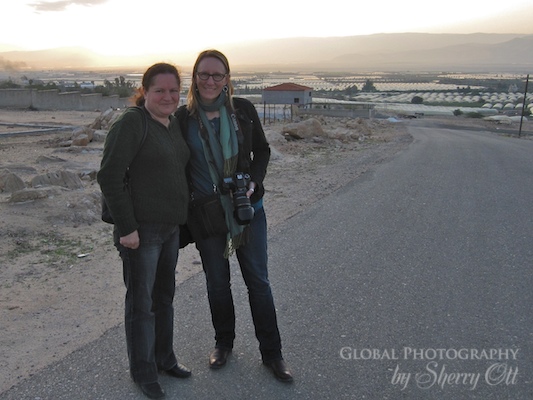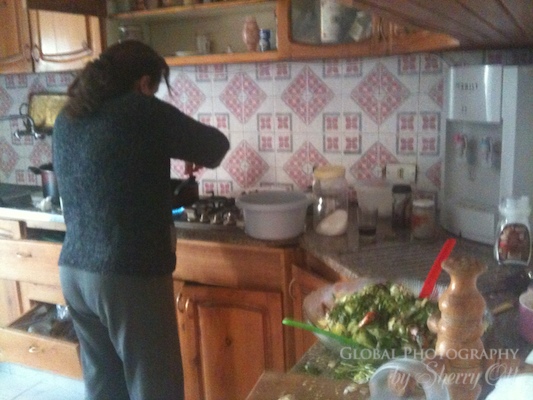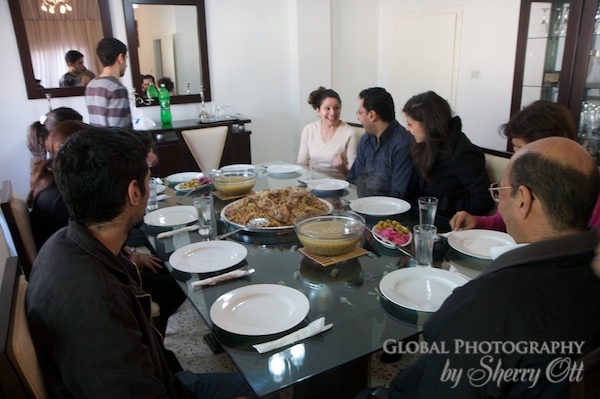Family Ties

Etidal and myself - watching sunset on the West Bank
I’ve quickly learned that the Conversation Corps is not really what I would call a volunteer program. Instead, my experience has been completely about cultural exchange; a massive dose of cultural exchange that can knock even the most experienced traveler on their ass. Yes, I’ve had to adjust, adapt, and accept throughout this process. But I feel you are unable to get experiences like this when you are simply traveling. It’s good to stop for a while and really dig in to a culture and get a little uncomfortable.
Whenever you have the opportunity to live with a family 24/7, you can’t help but exchange cultural oddities, joys, and frustrations. This month in Jordan has been one of my most complicated and amazing months of travel thanks to close living quarters and a vastly different culture than what I’m used to. I’ve had to adapt to ‘real life’ in this foreign world.
What’s it really like to be a part of a family in Jordan?
The first and most important thing to realize is you aren’t going anywhere until you have a ring on your finger. Kids live at home until they get married. I tried to push a little on this topic, asking “Really, if I had grown up in Jordan are you telling me I’d still be living at home at 40 years old?” The answer was pretty much always yes. It didn’t matter what religion or gender you were; this was Arabic culture, not religious culture. I actually found this cultural distinction really important in the Middle East. I think I had always thought about religious culture driving the Middle East, but Arabic culture is the one thing that actually ties the region together.
The household I lived in had 3 of the 4 kids still living there; and they were all over 18 years old (28, 23, and 18 to be exact). The other daughter, Rawan, was married and of course living outside the family home. This creates some really different dynamics; just imagine for a second if you were still living with your siblings at 28 years old…not to mention your parents! The one thing that seems to hold true is you’ll still fight with your parents and you’ll still fight with your siblings as long as you are under the same roof. Not just verbal…but petty little things that can turn into playful nudging matches between siblings. Stealing each other’s cell phones, borrowing a car but not filling it with gas when you bring it back, teasing over things that you wear; I felt as if I had stepped back in time about 25 years and my brother was back driving me insane.
But on the flip side of that, you will become closer than ever with them too. No one will know you better than your family. I was absolutely touched when 2 of the kids were leaving on a road trip to Lebanon for a 3 day weekend and the family reacted as if they were leaving for a 6 months overseas trip…there were multiple good byes, kisses, and hugs. Then, when they arrived home from the weekend, it was an event too. They returned and the whole family greeted them with hugs and kisses. Then they all sat down together to eat a feast at 10:30PM and discuss all aspects of the 3 day trip. My US family only gathers like this on special holidays, certainly not for a weekend trip. In general, you spend the majority of time with the family. Even Rawan and her husband would stop by practically daily and simply hang out in the family room for hours. You never seem to stray far from home in Jordan.

Etidal cooking away in the kitchen
Living at home also means you have a mother taking care of you until you get married. Cooking, cleaning, doing laundry…I was in awe of the amount of work Etidal did in a day to take care of adult children. She woke up every morning and made sure they had tea and breakfast. She also made them sandwiches to take to work for lunch. Next, it was laundry and cooking so the kids had something to eat when they arrived home from work. It was constant; as soon as she finished one meal and got it all cleaned up, she would be pealing potatoes for the tomorrow’s meal! I felt a bit uncomfortable having someone wait on me and take care of me to such a degree at times. I’ve lived the past 23 years completely on my own so it certainly was a cultural adjustment to make. Granted, I helped out whenever she would let me, but often times I was told to simply sit and relax as she did all the work.
Living with parents also means you have a curfew! I was actually out one evening at 1AM and I suddenly panicked as I thought of Etidal sitting on the couch waiting up for me and upset that I’m still out after ‘curfew’. I had seen this happen many times before with the other kids; but now it was me! I absolutely had never considered the fact that at 40 years old I’d be panicking about missing curfew!
With these close living quarters, you might wonder how in the world you ever meet a significant other. I was fascinated to learn about dating in Jordan. Much of the time your family sets you up to meet potential mates. Dating really wasn’t something you did for years and years; certainly not in public. I learned there are sly ways around the ‘cultural rules’, but it all still seemed completely tame to me and my independent western ways. Boyfriends and girlfriends would normally only meet within groups or sometimes within the formal living room of the house to sit and talk. Talk?! There seemed to be little alone time for couples – at least on the surface of what I witnessed.

A typical weekend family dinner gathering
The hardest thing for me to get used to was it wasn’t simply about a closeness with the family – but it was the whole extended family. When you live in a household in Jordan, you become part of the family…the whole family. Weekends are spent visiting the extended family; I found myself at family dinners on Friday afternoons for hours. One of the other GeoVisions Conversation Corps participants was obliged to go to a funeral because he was ‘part of the family’. Family obligations are strong; and certainly nothing like how I grew up. It actually made me really admire the culture as I think Americans have lost this family connection and it’s a shame.
Cultural adaption isn’t easy; but it helps you grow and it keeps you stimulated. It helps you build skills of patience, listening, communication, and adaptability. I was consistently impressed with the family ties in Jordan and among my host family. It left me longing for those types of relationships in my life. Sure, it was hard at times to be waited on, have a curfew, and share a bedroom; but it’s all part of the experience. I can safely say that I haven’t laughed that much in a family situation in my life. It was fun loving, it was passionate, it was energetic, it was infuriating; it was my family.







Sage Russell on Wed, 9th Feb 2011 12:03 pm
Great story with great observations. The point about Arabic culture rather than religious culture shaping things is especially insightful. I often wonder how much searching and consumption occurs in The US because people are so detached from family, community, and the satisfaction of a simple meal shared with people you love.
Enjoy the adventure.
~Sage
Tweets that mention Family Ties | Briefcase to Backpack - Travel Advice for Career Breaks or Sabbaticals -- Topsy.com on Wed, 9th Feb 2011 12:47 pm
[…] This post was mentioned on Twitter by Dr. Jessica Voigts, Sherry Ott. Sherry Ott said: Family Ties in #Jordan – they were fun loving, passionate, energetic, and infuriating; it was my family http://ow.ly/3T90e #volunteer […]
Donna Hull on Wed, 9th Feb 2011 6:29 pm
Thanks for the look at family life in Jordan. You are right, as a casual traveler, you would never have gained the insight. What an experience for you.
islandmomma on Thu, 10th Feb 2011 10:13 am
What a fascinating, eye-opening post. I knew that family life was like this in sub-Saharan Africa, but I didn’t realize that it was so in such an apparently sophisticated country by Middle East standards as Jordan. Very interesting comment about it being Arab culture rather than religious.
I’m not convinced about it being a better way of life. My grandmother, in the north of England lived this kind of life at the beginning of the 20th century, and it made life very hard for her. Maybe, yes, in the west we could benefit from being closer to our families, and probably a comprise between the two would be a good thing, but to be tied to family when the family, especially if it’s the parents, aren’t especially nice or good people is bad, and the guilt involved in breaking from them can be considerable and unfair.
What did they say when you told them about your way of life? Did you find that they made exceptions for you because you are a westerner?
Sherry Ott on Thu, 10th Feb 2011 3:53 pm
Yes – they absolutely made exceptions for me and my culture. They were just as eager to learn about my life and how I lived – that was what was so great about the cultural exchange.
I do agree with you – I think there is a happy middle ground somewhere for all of us!